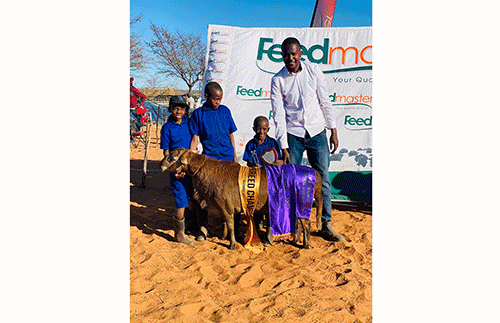In 2019, an unprepared Kamakotje ‘Kamaa’ Marenga decided to test the depth of the water with both feet. He rounded up a few of his aspiring Veldmaster sheep breeds and threw them into the kraal with those of other farmers.
The occasion was the maiden edition of the Otjinene Expo, and he had to contend with established farmers who have been in the game for much longer than the two years Marenga had under his belt as an aspiring stud farmer on his own.
The result was a bitter pill to swallow; none of his five sheep – four ewes and one ram – fetched any price. Instead, he received criticism – albeit positive – from those who examined them. These were experienced breeders of the Veldmaster. It was a baptism of fire for the young farmer from Eiseb in the Omaheke region, but one that nudged him in the right direction. He refused to hang his head down in shame – and like oil to a fire, a new passion was ignited in Marenga.
Fast-forward a year or two, Marenga has already hosted his first major production auction. That was the beginning of bigger and better things to come. But it had to take him a heart of steel and the determination of a honey badger to get him to where he is today – a prominent stud breeder of one of the most sought-after sheep breeds in the country.
“After the Otjinene Expo, I decided to take the challenge head-on. I knew that what was being said at the expo on why my animals did not make the grade was to encourage me. I took it in a positive light, as I was aware of my shortcomings as a relatively new stud farmer,” he said.
In a quest to improve his herd, Marenga acquired a full-bred Veldmaster ram from prominent farmer Zico Coetzee during a Namboer auction.
It is this ram that rewrote his story. Soon, its offspring were noticeable and a further process of refining and developing their quality-produced sought-after Veldmasters. He was slowly making a mark in the tough world of stud farming and the common denominator was one word – Veldmaster.
“I have always loved the Veldmaster sheep. The fact that this was originally a composite breed, taken from various other breeds, has made this sheep an almost complete breed. It has taken characteristics from each of the breeds it was originally bred from, and that has helped it perform well on many counts,” Marenga noted.
Today, the determined farmer breeds with his favourite Veldmaster – both as a stud and commercially. His recipe is simple: breed quality ewes and rams for the local market, but if such sheep fail to reach the required potential and standard, they are transferred to the commercial kraal and would be later sold for meat.
The practice seems to be working for Marenga, as both farmers and business owners continue to demand his products – both his stud rams and sheep carcasses.
“The fact that the Veldmaster is bred from both fat-tailed and non-fat-tailed sheep has made it a breed of choice for many butchery owners. The Veldmaster’s meat is bulky with limited fat on it, which many prefer,” he said.
Whilst encouraging others to take on farming as a way to sustain themselves, Marenga warned that the agribusiness sector – just like any other form of business – is beset with challenges, and one needs a thick skin to overcome them.
Most prevalent among the challenges is the need for decent infrastructure for your mode of farming. This becomes even more crucial when you practise stud farming as you would want to maintain a pure bloodline for your animals and avoid them being contaminated by others from around your area of farming.
Water scarcity and poisonous plants on which livestock accidentally feed are other challenges that could be discouraging to new farmers.
“The trick is to remain focused on your goal. Times will be hard, and your will shall be challenged. Remain determined. Remain steadfast and keep pushing for what you believe in. A weak heart never won a thing; never give in,” Marenga said.
– tjatindi@gmail.com



